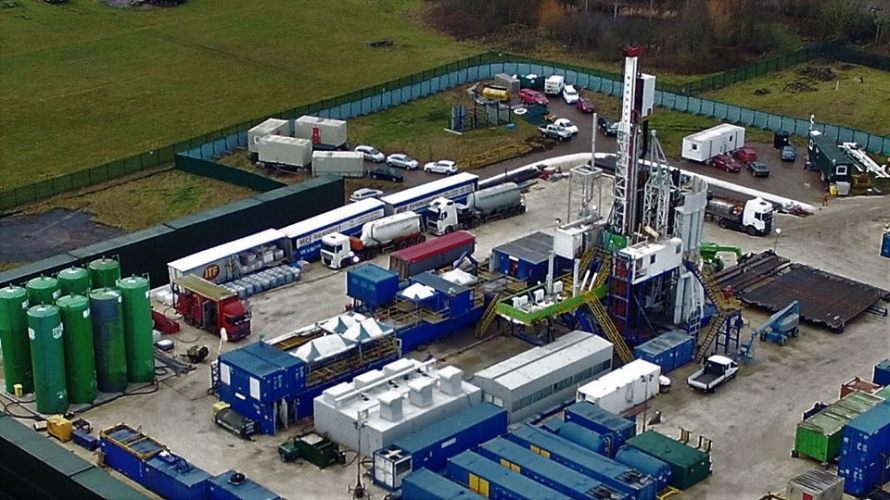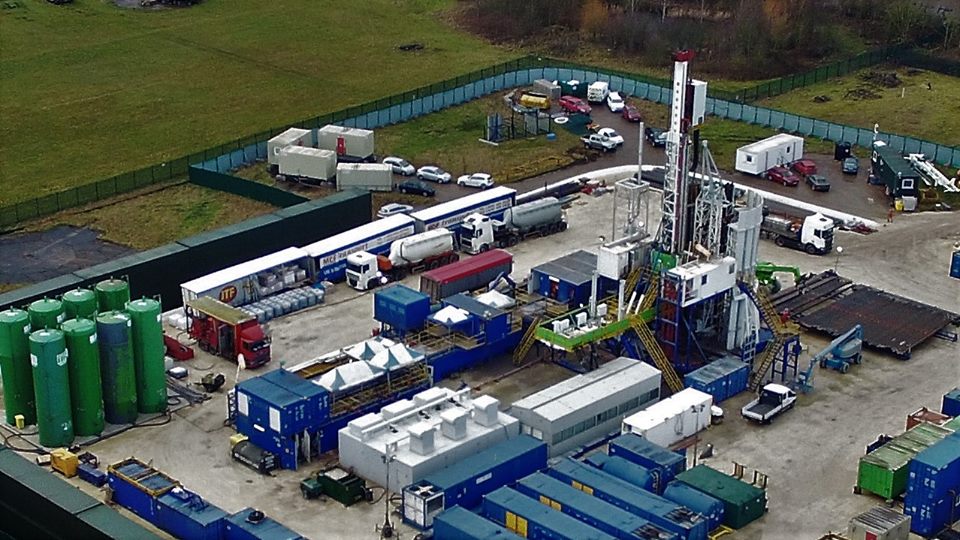A block on onshore oil and gas extraction will be debated at the Lib Dem conference tomorrow (Sunday 21 September 2025).
 IGas shale gas site at Misson Springs, Nottinghamshire, 4 February 2019. Photo: Eric Walton
IGas shale gas site at Misson Springs, Nottinghamshire, 4 February 2019. Photo: Eric WaltonA policy paper put to the meeting in Bournemouth recommends banning new onshore oil and gas production.
The party’s proposals for climate policy seek to “put people first”. The first commitment said the party in government would:
“Protect people from future energy shocks by investing in renewable energy and reducing Britain’s dependence on fossil fuels, including banning onshore production.”
Pippa Heylings, MP and Lib Dem spokesperson for energy security and net zero, said today:
“This is a line in the sand. The Liberal Democrats are stepping up where others row back. We are banning new onshore fossil fuels to protect communities and drive a just transition.
“While the Reform party turn to fracking, the Conservatives to dwindling fossil fuels and Labour to dithering, we’re making a bold stand for the future. Clean energy, community resilience, and climate justice aren’t negotiable—they’re overdue.”
The conference policy paper said extraction of small volumes of onshore coal, oil and gas production caused greenhouse gas emissions and had “negative impacts on communities, the local environment and the local established economy”.
The paper said:
“We would accordingly ban all new onshore coal, oil and gas exploration and production, including fracking. In reality, new onshore extraction would make a minimal difference to UK production and European energy security.”
The paper also proposed a ban on the listing of companies extracting oil, gas and coal from the London stock exchange.
Under other proposals, the Lib Dems said demand for oil and gas would “fall steadily” but not to zero. Replacing UK gas with imported US liquified natural gas would “raise emissions, the paper said.
It said the Lib Dems in government would “keep open the option to allow extraction from new [offshore] fields which had already been licensed”. But there would be conditions on emissions and European supply security.
“Protect communities from bad development”
The Lib Dem proposal on banning onshore oil and gas goes beyond the party’s previous commitments. In 2024, the party promised to maintain the moratorium on associated hydraulic fracturing (higher volume fracking), introduced in 2019.
Lib Dems supporters said the move to ban onshore oil and gas was part of the just transition to a low-carbon economy. They said they did not want to expose any new community to fossil fuels.
Environmental campaigners have welcomed the move:
Rosie Downes, head of campaigns at Friends of the Earth, said:
“At a time when some parties are turning their backs on climate action, threatening our children’s future as climate extremes increasingly batter the world with floods, droughts and wildfires, it’s refreshing to see this bold motion to ban all new onshore coal, oil and gas exploration and production from the Liberal Democrats.
“Communities have fought tooth and nail to keep drilling and fracking out of their backyards, but they shouldn’t need to. A clear and comprehensive ban on onshore oil and gas extraction, including fracking, would protect communities from bad development, help to end our fossil fuel dependency and go towards building a cleaner future – with warm homes, green jobs and lower bills.”
UK onshore oil and gas production currently represents a tiny proportion of the national total.
Recent figures show that UK onshore gas contributes less than 1% to the total production.
Onshore oil represents about 2% of total UK production. But about 80% of onshore oil production is from one field, at Wytch Farm in Dorset. Though classified as an onshore field, Wytch Farm’s operations span offshore. Much of the oil is from the Sherwood Sandstone, which extends under Poole Harbour and into Poole Bay.
“End uncertainty”
The Lib Dem move coincides with a call for the ban on onshore oil and gas from the apolitical campaign group, Frack Free United.
In a recent article it said:
“it is time to move beyond half-measures, political point-scoring, and ambiguous promises. The patchwork of local decisions and inconsistent enforcement does not add up to real protection. Only a complete, unequivocal ban on all forms of onshore fossil fuel extraction can end the uncertainty. Such a ban would send a strong signal that the future is based on clean, renewable energy and that the days of risking our countryside for short-term gain are over.
“the time for ambiguity and compromise has passed. The evidence is clear, and the will of communities is stronger than ever. Now is the moment for a nationwide ban on onshore fossil fuels.”
Frack Free United described as “mission creep” of gas applications, despite a moratorium on fracking.
It said:
“the national conversation remains clouded by vague definitions of techniques and loopholes, exploited by lobbyists and company planners. Too often, the public is left confused by shifting government language around “conventional” extraction and frustrated as new projects are being pushed through under the banner of energy security without proper transparency or accountability.
“This piecemeal approach leaves communities to fight their own battles, pitted against well-funded energy companies, while meaningful national protections remain out of reach.”
Other Lib Dem energy policies
The Lib Dem policy paper also says the party would:
Support a just transition as North Sea oil and gas production declines, with strong support for workers and communities, reorienting infrastructure and skills towards renewables, carbon capture and storage and decommissioning. We would reduce emissions from extraction.
Bring forward to 2028 the current target of 2030 for banning routine venting and flaring from oil and gas wells
Expand the UK’s emissions trading scheme to cover methane emissions from the oil and gas sector produced through venting and leaks
Apply stringent minimum standards to the upstream carbon intensity of domestically produced and imported oil and gas.
The conference paper is scheduled to be debated tomorrow (Sunday 21 September 2025) at 3.15pm. Link to conference agenda and papers
.
Categories: Politics
